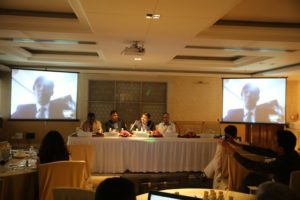20th April 2016 New Delhi, India
Linking climate research to policy: a regional dialogue
I was privileged to attend the dissemination event of DFID’s CRISSA (Climate Research and Information Services in South Asia) programme which remains close to my heart due to my role in programme managing it during my short stint with the DFID’s South Asia Research Hub in 2012-13. As I spent two full days sitting back (quite literally, being a backbencher!) and listening to stimulating presentations and discussions by leading experts from the South Asia region, I was awed by the warmth and openness all the researchers shared to further their collaborations. Research and innovation is truly a space where all borders and differences are broken by the drive to achieve common goals and of course the use of cutting- edge technology (Skype!).
Here is a guest post on the outcomes of CRISSA projects as well as the discussions held during the event, authored by Anirban Ganguly and Sruthi Chandrasekaran from the DFID South Asia Research Hub (SARH).
A group of over 70 climate experts from South Asia and beyond, representing the community of researchers, policymakers and donors, met in New Delhi on 7 and 8 April, 2016 to discuss findings of a suite of research studies funded over the last five years by DFID’s CRISSA (Climate Research and Information Services in South Asia) programme. The regional consultation, organised by DFID’s South Asia Research Hub (SARH), in association with Vertiver, generated a rich and engaging dialogue on the policy implications of research on a wide range of climate-relevant issues, spanning the biophysical and social sciences.
The consultation served as a platform for researchers and policy makers to engage, debate and share ideas with each other. The first day saw lead researchers presenting the key findings from their work and practitioners commenting on the relevance of these findings. The second day featured policy makers, donors and researchers discussing issues of coordination and regional coherence in the design, delivery and uptake of climate research.
While several CRISSA studies – such as ones on glacier monitoring in the Himalayas using unmanned airborne vehicles (read more here) and the resilience of groundwater resources in the Indo-Gangetic basin (read more here) – demonstrated how research was pushing the frontiers of the physical sciences, others delved on community-led modes of climate action, focusing on adaptive and participatory approaches. Issues of resilience to climate change at the community level were discussed extensively, drawing on case studies from across the region (read more here). Macro-level policy issues also found a place – with a presentation on ‘green growth’ strategies in South Asia (read more here).

The second day brought up many interesting issues related to the challenges of evidence based policy making. Dr. Nafees Meah, who heads Research Councils UK, India pertinently observed that while high quality research takes time, policy decisions need to be taken on a much quicker timeline. It is indeed a challenge to work across these time scales.
Also, climate issues can be extraordinarily complex and their findings need to be communicated in a manner that is relevant to the context in which decisions are made and is comprehensible to the policy maker. An engaging conversation on effective modalities for communicating research to policy makers took place later in the day. One possible approach towards this could be for scientists to ‘co-create’ research products with policy makers, involving them right from the stage of ideation.
Another challenge is the difficulty with maintaining sustained engagement at the highest levels of bureaucracy, with officials moving after completion of tenure. Panellists observed that engaging with more permanent structures such as technical agencies could be an alternative. Mr. Jagat Bhusal, Chairman, Society of Hydrologists and Meteorologists (Nepal) pointed out that while decision-makers in specific roles may be temporary, voters who influence their decisions are permanent, and hence it is crucial to engage with communities directly as part of the research process.
Ms. Jean-Marion Aitken, Head, SARH reminded the participants of the importance of keeping track of policy uptake, as policy impact is often realised well after the lifetime of the research programme. Sharing this information with funders helps them advocate for more funds for research.
The policy making environment is indeed messy, and the links between research and policy can be tenuous. Climate research also needs to deal with notions of uncertainty at a very basic level; communicating this to those who must take real life decisions (and be accountable for them) is tough. In this context, it is all the more important that the research itself is done well, and actionable messages reach those who can make a difference. The consultation served as a small step in that direction, trying to the bridge the barriers between the community of researchers and policy makers – bringing science just a little bit closer to all the action!
Learn more about CRISSA research!
Hello!
I am Gayathri Loka from BBC Asian Network. I am looking to cover a story regarding the pollution levels in both New Delhi and London. Please do let me know if you will be available to talk about this on air. Also, if you do any South Asians associations or communities in London who are doing their bit to reduce the pollution in London, let me know.
Waiting to hear from you
Gayathri Loka